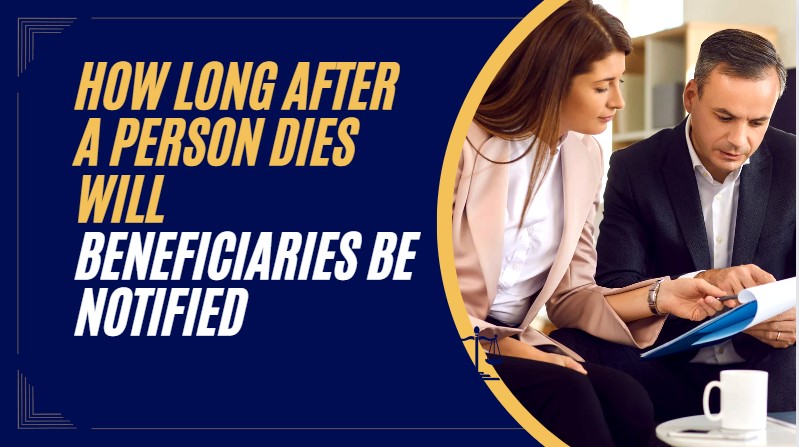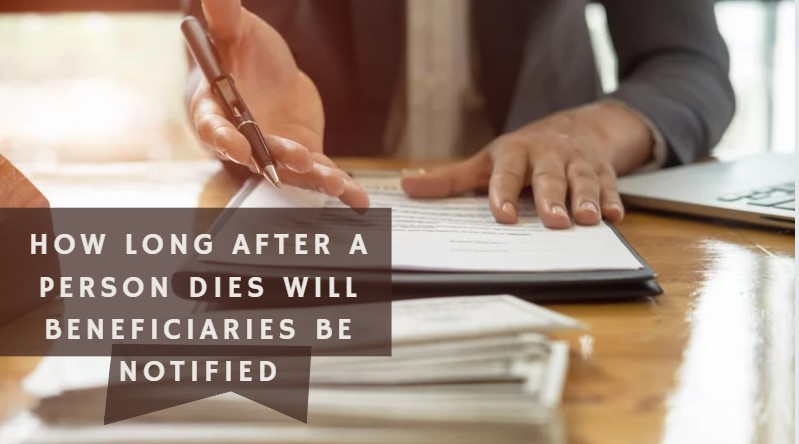How Long After a Person Dies Will Beneficiaries be Notified
If a loved one names you as a beneficiary in their will, you have the legal right to be informed about it.
Although there isn’t a legal time frame to be notified if you are a beneficiary, the executor should let you know as soon as possible.
The law gives you the right to access specific information if you aren’t notified of your rights as a beneficiary in a timely and appropriate manner.

Notifying Beneficiaries
The beneficiaries listed in a will or trust have to receive the deceased person’s assets upon death. The probate judge has a duty to supervise this process, authenticate the will or trust, then instruct executors and trustees to gather and allocate assets listed in the will or trust. Lastly, the executors and trustees are required by law to inform each beneficiary listed.
This is usually not a hard thing to do. However, executors and trustees must follow specific guidelines.
Who Notifies Me That I Am a Beneficiary of a Will?
Generally, executors are expected to notify beneficiaries of the asset around 3 months after the will has been lodged in probate court. Once an item is accepted to probate, it’ll become publicly available. A beneficiary may request a copy of the will from the probate court for scrutiny if they believe there is an issue with the will or that they are not getting all of their entitlements under it.
If the estate’s assets are not listed in the will and are not subject to probate, then no formal notification is required.
However, if the will is lodged in the probate court, the trustee is legally obligated to notify all beneficiaries of the death of the person who established the trust (referred to as the settlor) within 60 days. This notice must contain the following:
- identity of Settlor
- Name and contact details of the trustee
- Address of the place where the trust is being managed
- When the trust was set up
- Anything else the trust might wish for the trustee to disclose to the beneficiaries
- notify the beneficiary of their right to receive a copy of the trust’s terms
The beneficiary should speak with an estate-experienced lawyer as quickly as possible if they believe a copy of the terms provided is inaccurate or if the trustee refuses to give them one. Beneficiaries typically have a 120-day window to contest a trust after receiving notice of it.
Read: 22 Tricks Lawyers Use in Depositions
What Will Happen If I’m Not Notified by the Trustee?
When a will is submitted to the probate court, it is made public information. So, beneficiaries ought to be able to get hold of the full will from the court.
If you discover you are a trust beneficiary but were not informed, you should contact an estate lawyer right away. An estate lawyer will send a letter to the trustee on your behalf requesting the necessary notification and a copy of the trust agreements.
Let’s say the trustee continues to withhold official notifications and documents. In that situation, the estate lawyer can thereafter lodge a petition to the probate court to order the trustee to abide by the guidelines. If the trustee consistently fails to submit the required documentation, it is possible to get them fired and replace them.
Best Practices for Handling a Trustee Who Is Uncommunicative
Whatever the case, it’s important to maintain goodwill and avoid giving the trustee any excuses to avoid communication. Verbal abuse and a confrontational attitude won’t make things better.
The best path to take, should the trustee continue to be difficult, is to hire an attorney to manage all communications. An attorney can serve as an independent advisor and counsel the beneficiary on the best course of action and how to handle communications.
If it doesn’t work, he (the attorney) can submit a petition to the probate court. This will enable the beneficiary to access court orders, document requests, witness statements, and other discovery devices. If the trustee still won’t work with you, you can file a petition in probate court to get immediate access to important financial data from banks or brokerage firms.
FAQ
What should you do first when someone dies?
- Get a death certificate from the authorities.
- Make arrangements for the body to be taken away.
- Drawing up plans for the care of the dependent’s family and pets.
- Confirm last-minute burial preparation.
- Get duplicates of the certificate of death.
How does the bank find out if someone has died?
Usually, the bank is notified when a client dies by their family or next of kin. It may also be a person who was designated by a court to manage the deceased’s finances. Banks can occasionally learn of a client’s death through probate.
